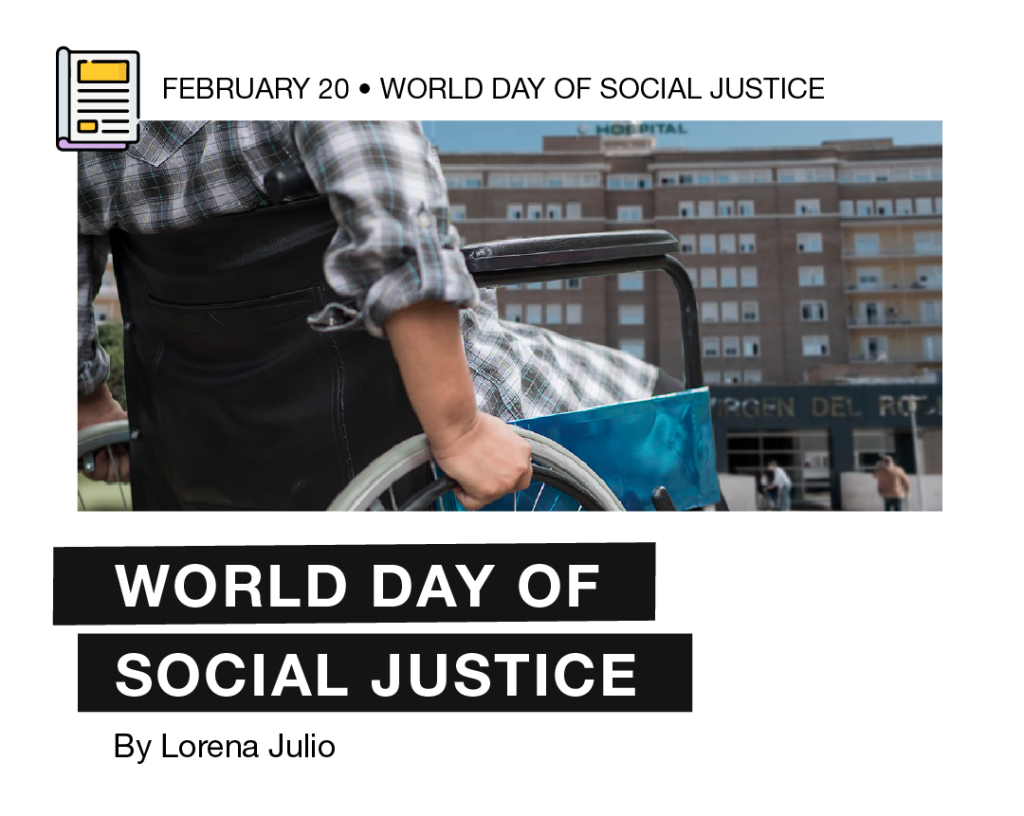By Lorena Julio
On November 26, 2007, the General Assambly declares June 20 as the World Day of Social Justice. This year, I would like to use this date to reflect upon a reality that persons with disabilities have lived with regard to the effective and full compliance of their right to access to healthcare, as stated by the Convention on the Rights of Persons with Disabilities (CRPD)2 and several international instruments.
Historically, persons with disability have been forced to be placed in a position of vulnerability, which affected and breached their rights. This also included the access to healthcare, even though Article 25 in the UN Convention points out that “The Member States recognize that persons with disabilities have full right to enjoy the highest attainable standard of health without being discriminated on the grounds of disability”.
Pamela Molina, expert in issues of Disability, who was involved in the CRPD writing, states in the book Inclusion vs Equity. Reconsidering the exclusion in Latin America (Inclusión vs Equidad. Repensar la marginación en America Latina) “Persons with disabilities are also the most vulnerable people in risk situations, natural disasters, and internal wars. However, in our region, until the arrival of COVID-19, there were practically no protocols for this group in these situations. Recently, this is beginning to be developed in our countries, before the evidence of higher rates of contagion and death in this group. On the other side, there are still, and they are accepted, “triage” measures in the emergency healthcare. Catalina Devandas, who was the United Nations Special Rapporteur on the Rights of Persons with Disabilities until June 2020, mentioned the existence of complaints, quiet concerning, of persons with disabilities that received in their homes letters from Health Systems requesting to sign “agreements” for no resuscitation in case there were no beds or ventilators at Intensive Care Units (Molina, p.39)3.
In Fundación Comparlante, we have hold meetings, we have participated in virtual events in which this problem was addressed, and we have known cases and received complaints of hospitals and health centers which denied caring for persons with disabilities in emergency situation. We acknowledge that these practices also occurred in several countries in Latin America.
The World Health Organization (WHO) defines the triage system as a method prioritizing gravity, symptomatology, health problem of a patient when he/she arrives at the Emergency Room, and it allows defining the patient´s treatment. Put into practice, the triage is a system selecting and classifying patients at Emergency Rooms based on their therapeutic needs and the resources available for their care. According to the Pan American Health Organization (PAHO) 4 “A modern structured triage system has to be understood as a comprehensive quality system for Emergency Rooms, whose implementation has direct positive effected on patients, on professionals and on the overall health system”. The truth is that many persons with disabilities has lived situations in which this system meant discrimination and a clear breach of their fundamental rights during the pandemic.
The Resolution approved by the General Assembly on November 26, 2007, establishing the World Day of Social Justice recognizes in its Article “that the social development and the social justice are essential for implementing and maintaining peace and safety in nations and among them, and which, in turn, social development and social justice cannot be reached if there is no peace and safety or if all human rights and fundamental liberties are not respected”. Social justice involves the right to life, to health, to equity of opportunities. María Soledad Cisterna, Special Envoy of the United Nations General Secretary on Accessibility and Disability, co-author of the joint statement “The right of life of persons with disabilities and older persons infected by Covid-19”5 that states “Every person with disability and every elderly infected with Covid-19 has the right to access Intensive Care Units, including mechanical ventilation systems and other supports to save their life on an equal basis with others. Life of every person has the same value. Applying correctly the triage does not admit selecting criteria or “rationalization” of human lives related to the disability or age of a person”. There is no life that has more value than another one, and the triage system cannot be a system violating rights of persons with disabilities.
As Cisternas6 has supported, the COVID-19 pandemic has proved how much the United Nations Conventions on the Rights of Persons with Disabilities has not been implemented during its 15 years of validity. Therefore, it is worth to reconsider if this social justice we are celebrating includes everybody or only one part of society.
1Naciones Unidas,(2007) Resolución de la Asamblea General el 26 de noviembre. Disponible en Internet: https://undocs.org/es/A/RES/62/10
2Naciones Unidas (2006) Convención Sobre los derechos de las Personas con Discapaciad https://www.un.org/esa/socdev/enable/documents/tccconvs.pdf
3Molina, Pamela (2021) Inclusión vs Equidad, Buenos Aires, Editorial Serial. Disponible en Internet: https://drive.google.com/file/d/1v2SBm4jm_yTJaEl6izAkjF6PuQpKCv5a/view?usp=drivesdk
4Organización Panamericana de la Salud (2011) “Manual para la implementación de un sistema de triage para los cuartos de urgencias”. Disponible en Internet:https://www.paho.org/hq/dmdocuments/2011/HSS_IS_Manual_Sistema_Tiraje_CuartosUrgencias2011.pdf
5Cisternas Reyes, María Soledad, Rosa Kornfeld-Matte (2021)Declaración conjunta. El derecho a la vida de las personas con discapacidad y personas mayores infectadas por el Covid-19. Disponible en Internet: https://www.un.org/development/desa/disabilities/wp-content/uploads/sites/15/2020/04/Versi%C3%B3n2-Decl-Est%C3%A1ndar-Bioet-Dpcd-ES20abril.pdf
6Cisternas Reyes, María Soledad (2020), Intervención en la Mesa Redonda “La Nueva Normalidad post COVID-19 y las Personas con Discapacidad en las Américas”. Disponible en Internet https://www.facebook.com/watch/live/?ref=watch_permalink&v=2610149699089014
